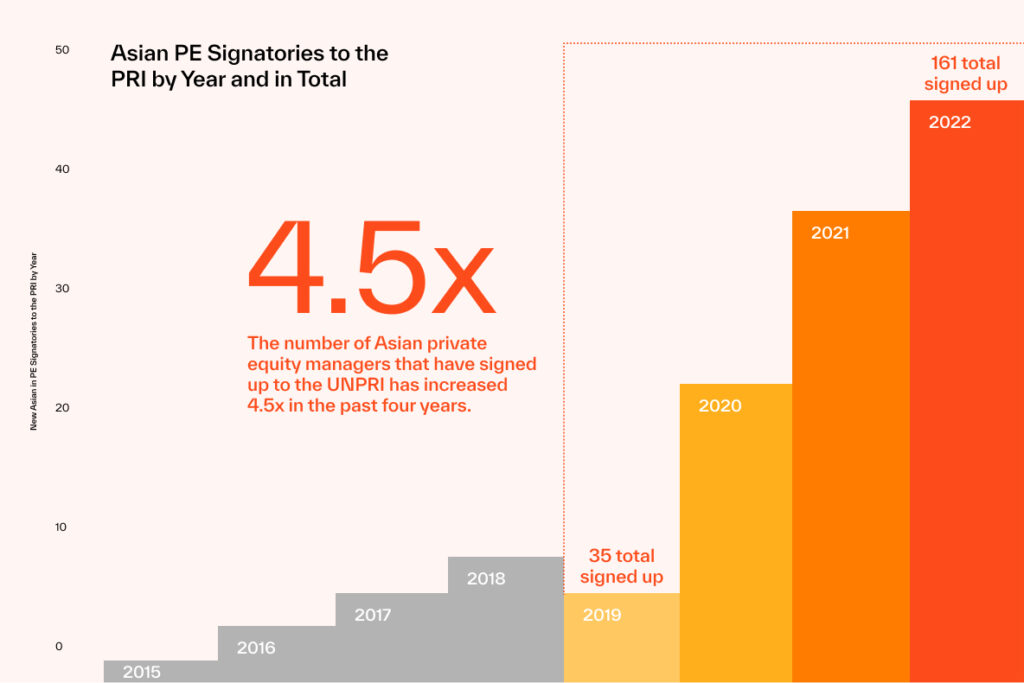Sustainable Private Equity in Asia: Making the Commitment
This is the first article in a series on approaches to ESG and sustainability among private equity fund managers in Asia drawn from our report, “Sustainable Private Equity in Asia: Through the Lenses of Compliance, Strategy and Branding”. Jointly developed with Mayer Brown, a leading international law firm, the report analyses regulatory requirements applicable to private equity fund managers across five jurisdictions in Asia, as well as common approaches to ESG integration and sustainability strategies and branding.
As providers of capital, private equity (PE) fund managers have long played a critical role in growing businesses and economies across Asia. With global attention turning to pressing issues like climate change and human rights, PE’s role in the region, along with how we think about business more broadly, is now being reimagined to incorporate environmental, social and governance (ESG) issues and broader concepts of sustainability. The trend is creating new regulations, shifting stakeholder preferences and highlighting opportunities for value creation that are changing the face of the industry.
Public commitments that adhere to ESG and sustainability standards and practices are often among the first steps a manager takes when integrating ESG into the investment process or developing a more fulsome sustainability strategy. Committing to well-regarded standards can be an important tool to quickly communicate a manager’s approach to key stakeholders, including limited partners (LPs), management teams at target companies and potential buyers at exit. The process may also give managers access to resources and tools to improve ESG and sustainability-related processes and build internal capacities.
Across Asia, commitments to implement the UNPRI’s six principles for responsible investment (Principles) are becoming increasingly common among PE managers.
What are the UNPRI Principles?
By committing to the UNPRI, PE managers commit to implement the following six Principles in their businesses:
Principle 1: We will incorporate ESG issues into investment analysis and decision-making processes.
Principle 2: We will be active owners and incorporate ESG issues into our ownership policies and practices.
Principle 3: We will seek appropriate disclosure on ESG issues by the entities in which we invest.
Principle 4: We will promote acceptance and implementation of the Principles within the investment industry.
Principle 5: We will work together to enhance our effectiveness in implementing the Principles.
Principle 6: We will each report on our activities and progress towards implementing the Principles.
The number of PE managers headquartered in Asia that have signed up to the UNPRI has increased 4.5x in the past three years.
Our review of publicly available information shows a 4.5x increase in Asian PE managers that have signed up to the UNPRI in the past three years, from a total of just 35 at the beginning of 2019 to 161 as of 31 December 2022. This rapid growth is helping to mainstream basic ESG integration in the region and could foreshadow a trend towards managers developing more advanced sustainability strategies in the future.

Despite the significant increase in firms signed up to the UNPRI, few regional PE managers have committed to other sustainability-related initiatives.
While many managers are committing to consider ESG issues in the investment process, fewer are taking concrete steps to manage those issues in a way that generates positive outcomes. For example, as of 31 December 2022, only 10 Asian PE managers had signed up to the United Nations’ Global Compact (UNGC), the world’s largest corporate sustainability initiative, which addresses a range of topics from human rights and labour to the environment and anti-corruption.
Similarly, as of the same date only eight managers had joined the list of supporters of the Task Force on Climate-related Financial Disclosures (TCFD), one of the leading disclosure standards for financially material climate information, which regulators are now adopting around the world.
Committing to other leading initiatives, in addition to the UNPRI, can help managers further develop internal capacities and set clear goals and targets to inform more holistic sustainability strategies. Thematic initiatives can also help managers prepare for future expectations to address areas of increased stakeholder attention, such as nature-related risks and opportunities arising from the work of the Taskforce on Nature-related Financial Disclosures.
Whatever the focus, committing to recognise a standard or initiative helps set the foundation for an approach to ESG and sustainability that can help PE managers better address stakeholder expectations, manage risk and create value within this new paradigm.
Download the full report, “Sustainable Private Equity in Asia: Through the Lenses of Compliance, Strategy and Branding”.









